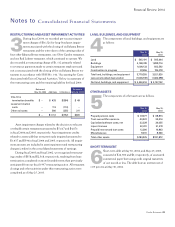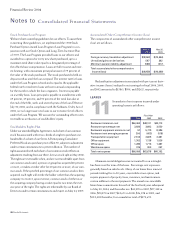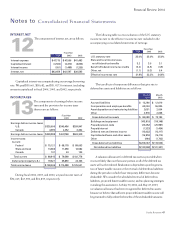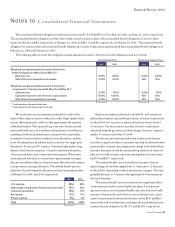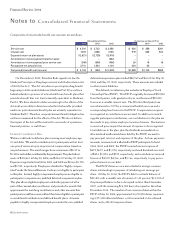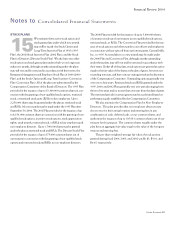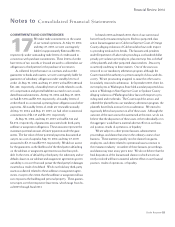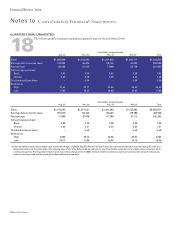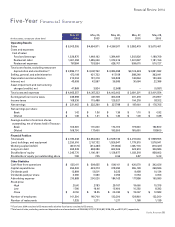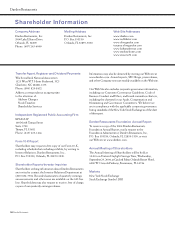Red Lobster 2004 Annual Report Download - page 53
Download and view the complete annual report
Please find page 53 of the 2004 Red Lobster annual report below. You can navigate through the pages in the report by either clicking on the pages listed below, or by using the keyword search tool below to find specific information within the annual report.Notesto
Consolidated Financial Statements
COMMITMENTSANDCONTINGENCIES
17We make trade commitments in the course
of our normal operations. At May 30, 2004,
and May 25, 2003, we were contingently
liable for approximately $242 and $8,301,
respectively, under outstanding trade letters of credit issued in
connection with purchase commitments. These letters of credit
have terms of two months or less and are used to collateralize our
obligations to third parties for the purchase of inventories.
As collateral for performance on contracts and as credit
guarantees to banks and insurers, we were contingently liable for
guarantees of subsidiary obligations under standby letters of
credit. At May 30, 2004, and May 25, 2003, we had $72,480 and
$41,442, respectively, of standby letters of credit related to work-
ers’ compensation and general liabilities accrued in our consoli-
dated financial statements. At May 30, 2004, and May 25, 2003,
we had $15,896 and $7,503, respectively, of standby letters of
credit related to contractual operating lease obligations and other
payments. All standby letters of credit are renewable annually.
At May 30, 2004, and May 25, 2003, we had other commercial
commitments of $2,125 and $2,250, respectively.
At May 30, 2004, and May 25, 2003, we had $4,346 and
$4,254, respectively, of guarantees associated with third-party
sublease or assignment obligations. These amounts represent the
maximum potential amount of future payments under the guar-
antees. The fair value of these potential payments discounted at
our pre-tax cost of capital at May 30, 2004, and May 25, 2003
amounted to $3,131 and $2,935, respectively. We did not accrue
for the guarantees, as the likelihood of the third parties defaulting
on the sublease or assignment agreements was less than prob-
able. In the event of default by a third party, the indemnity and/or
default clauses in our sublease and assignment agreements govern
our ability to recover from and pursue the third party for damages
incurred as a result of its default. We do not hold any third-party
assets as collateral related to these sublease or assignment agree-
ments, except to the extent that the sublease or assignment allows
us to repossess the building and personal property. These guaran-
tees expire over their respective lease terms, which range from fis-
cal 2005 through fiscal 2012.
In March 2003 and March 2002, three of our current and
former hourly restaurant employees filed two purported class
action lawsuits against us in California Superior Court of Orange
County alleging violations of California labor laws with respect
to providing meal and rest breaks. The lawsuits seek penalties
under Department of Labor rules providing a one hundred dollar
penalty per violation per employee, plus attorney’s fees on behalf
of the plaintiffs and other purported class members. Discovery
is currently underway in these matters. One of the cases was
removed to our mandatory arbitration program, although the
Court retained the authority to permit a sample of class-wide dis-
covery. We are prosecuting an appeal to cause the other case to
be similarly removed to arbitration. In September 2003, three for-
mer employees in Washington State filed a similar purported class
action in Washington State Superior Court in Spokane County
alleging violations of Washington labor laws with respect to pro-
viding meal and rest breaks. The Court stayed the action, and
ordered the plaintiffs into our mandatory arbitration program; the
plaintiffs have filed a motion for reconsideration. We intend to
vigorously defend our position in all of these cases. Although the
outcome of the cases cannot be ascertained at this time, we do not
believe that the disposition of these cases, either individually or in
the aggregate, would have a material adverse effect on our finan-
cial position, results of operations, or liquidity.
We are subject to other private lawsuits, administrative
proceedings, and claims that arise in the ordinary course of our
business. These matters typically involve claims from guests,
employees, and others related to operational issues common to
the restaurant industry. A number of these lawsuits, proceedings,
and claims may exist at any given time. We do not believe that the
final disposition of the lawsuits and claims in which we are cur-
rently involved will have a material adverse effect on our financial
position, results of operations, or liquidity.
53
Financial Review 2004


